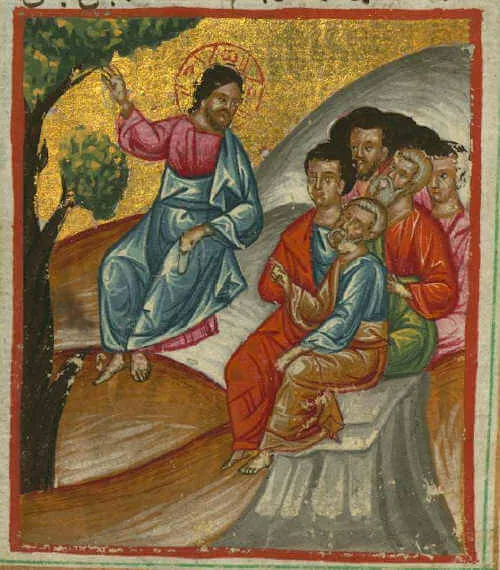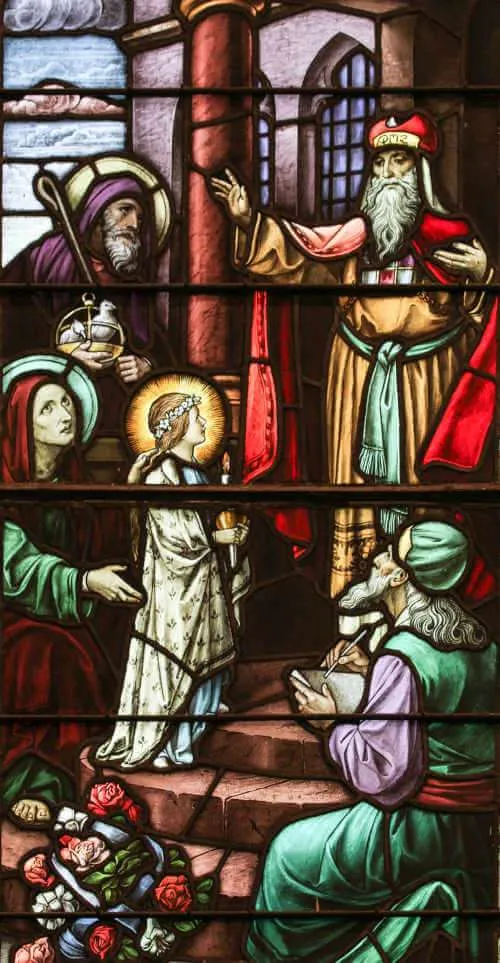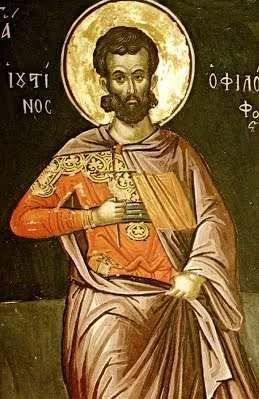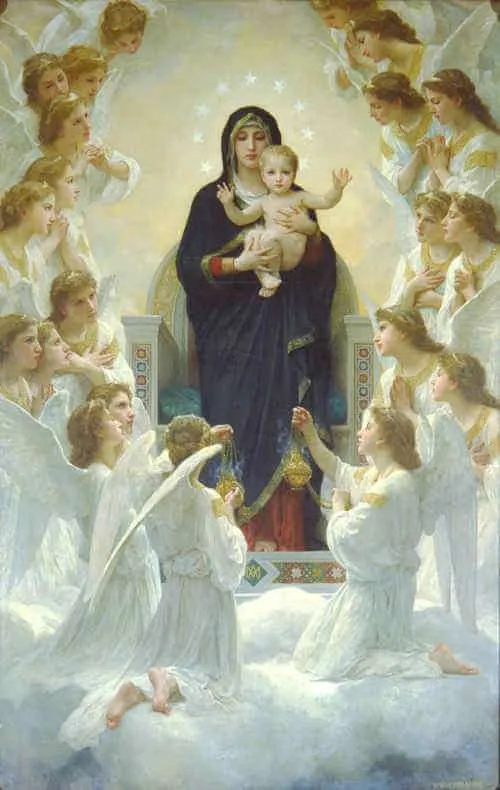c. 339–c. 397; Patron Saint of beekeepers, bishops, candlemakers, domestic animals, geese, honey cake bakers, learning, livestock, police officers, schoolchildren, security personnel, starlings, and wax refiners; Pre-Congregation canonization
In 1298, Pope Boniface VIII named today’s saint as one of the four original Doctors of the Church, along with Saints Augustine, Jerome, and Gregory the Great, cementing his importance in the history of the Church. Ambrose was born into a prominent family, with his father, Aurelius, serving as the Praetorian Prefect governing Gaul, France, and beyond. Ambrose was raised in a household of faith and learning. While his father was governor, his mother took Ambrose to Rome to receive a strong education in rhetoric, law, and literature to prepare him for an important political career. A legend from his infancy states that a swarm of bees landed on his face and left a drop of honey, which his parents interpreted as a sign of future greatness and eloquence. As was common at that time, Ambrose was not baptized as an infant but remained a catechumen even into his adult years.
When Ambrose was around the age of thirty, he was appointed as Governor of the Provinces of Emilia and Liguria, a region that included Milan. This position was considered a stepping stone to higher political roles. While Ambrose served as governor, the Church was suffering from internal divisions due to the ongoing effects of the Arian heresy. Despite Arianism’s condemnation in 325 at the Council of Nicaea, many laity, clergy, and even bishops refused to reject the heresy and accept the Nicene Creed.
In 374, when Ambrose was about thirty-five, the Arian Bishop of Milan passed away. The city found itself in religious turmoil between the Arians and the Catholics. Ambrose, concerned for the peace of the city, personally offered to supervise the election of a new bishop. The eloquence with which he handled the situation had an unexpected effect. Both sides respected him—Catholics for his faith and Arians for his honor. As a result, the crowd began chanting “Ambrose for bishop!” Frightened, Ambrose fled. He argued that he had no theological training and had not even been baptized. However, when Emperor Gratian approved his appointment, Ambrose reluctantly agreed. He was baptized, ordained as a priest, and then consecrated a bishop.
After his consecration, Bishop Ambrose began an intense period of theological and scriptural study. Because he was already well versed in Greek, Latin, and the classics, he quickly mastered Catholic theology. He was also quick to learn the Old Testament and the progression of salvation history. His approach to the Scriptures was unique in that he often read it silently, reflecting upon the meaning in his heart. At that time, Scripture was normally read aloud. This practice of interiorly reading Scripture is known today as lectio divina and has become the standard method of praying with the Scriptures. This interior reading of Scripture, coupled with his training in rhetoric, proved invaluable when he became a preacher, drawing large crowds to packed churches. Ambrose fully committed himself to his new ecclesiastical mission. He quickly realized that he not only needed to learn and proclaim the orthodox faith, he also needed to live it. Shortly after his ordination, he gave away most of his wealth and land, only keeping what was necessary to ensure the well-being of his sister and family.
Though the Arians had hoped they could win him over to support their side, Bishop Ambrose quickly took the orthodox position, rejecting Arianism. He saw that the Arians were divisive in the community and that he must be the source of true unity and the leader of the faith. He spent much time shepherding the people of his diocese and the rest of his time praying and studying the Word of God.
As Bishop Ambrose’s reputation spread, he caught the attention of Augustine of Hippo, who followed the philosophy of Manichaeism. Augustine moved to Milan to take up a teaching position and began to listen to Bishop Ambrose preach. Augustine’s mother, Monica, had relentlessly prayed for her son’s conversion and asked Bishop Ambrose to intervene. Though Bishop Ambrose’s preaching and teaching had a powerful effect upon Augustine, it was the bishop’s personal life that affected Augustine the most. Augustine later wrote of the bishop:
I arrived in Milan and encountered Bishop Ambrose, a man celebrated globally as one of the finest individuals and a devout servant of Yours. His eloquent sermons richly provided Your people with the core teachings of Your wisdom, the joy of Your grace, and a profound spiritual enrichment akin to uplifting wine. Unbeknownst to me, it was by Your guidance that I was led to him, so that through him I could knowingly be led to You. This man of God welcomed me with fatherly warmth and extended to me the kindness befitting a bishop upon my arrival (Confessions Book V)
Augustine saw in Bishop Ambrose not only a man filled with wisdom and understanding, which were qualities that Augustine had been searching for his whole life, but also a man who cherished those eternal truths in his heart and lived them out. For example, when he saw the bishop reading the Scriptures silently, he sensed he was truly internalizing the message. This led Augustine to open the Scriptures and ponder them himself, leading to his conversion and baptism and to his being celebrated as one of the most influential saints in the history of the Church and even upon the whole of Western culture.
Bishop Ambrose also held great influence over the Roman emperors. Emperor Gratian had a good friendship with Ambrose and was the one who told him to accept his election as bishop. Bishop Ambrose later successfully encouraged the emperor to remove the pagan Altar of Victory from the Roman Senate. When Emperor Valentinian II came to power as a youth, his Arian mother, Empress Justina, acted as his regent. In her support of Arianism, Justina ordered Bishop Ambrose to turn over a church in Milan to the Arian bishop. He refused, writing to her, “If you demand my person, I am ready to submit: carry me to prison or to death, I will not resist; but I will never betray the Church of Christ.” Bishop Ambrose and his people locked themselves in the church and refused to leave. Saint Augustine wrote of this incident in the Confessions, saying, “The devout people kept watch in the Church, ready to die with their Bishop Thy servant” (Book IX). Seeing no way to convince the bishop and his people, the empress acquiesced.
In 380, Emperor Theodosius issued the Edict of Thessalonica, making Nicene Christianity the official religion of the Roman Empire, outlawing Arianism. Though Theodosius was an orthodox Christian, in 390 he committed a horrible atrocity, ordering a massacre in Thessalonica. When Bishop Ambrose found out, he wrote to Theodosius, demanding he do public penance and informing him he was forbidden to receive the Sacraments until he did so. The emperor complied.
In addition to being an outstanding pastor to his people and a powerful preacher, Saint Ambrose left behind a wealth of writings that have had a great impact on the Church’s theological tradition. In his writings, he is especially known for his refutation of Arianism and his teaching on the true nature of Christ and the Holy Spirit. He also wrote on the Sacraments, virginity, ethics, penance, and the duties of the clergy, and penned commentaries on Sacred Scripture. He left behind many letters of great importance, composed hymns, and wrote beautifully about our Blessed Mother.
As we ponder the life of Saint Ambrose, reflect upon his sudden and unexpected election as Bishop of Milan. Though he had his eyes on an important political career, God’s will was different; therefore, Ambrose cooperated with the divine will. As you ponder his life, consider any ways that your own will differs from God’s will for you. As you do, try to imitate Saint Ambrose by choosing the divine will and letting go of your own preferences and plans.
Source: https://mycatholic.life/saints/saints-of-the-liturgical-year/7-december-saint-ambrose-bishop-and-doctor–memorial/







